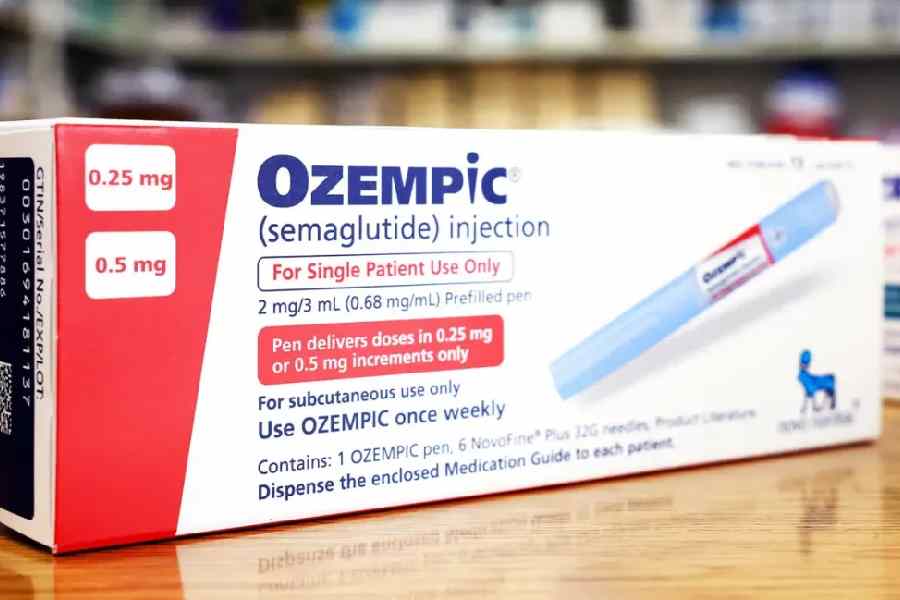Popular diabetes and weight loss medications like Ozempic and Wegovy have been linked with an increased risk of developing stomach paralysis, new studies have found.
Stomach paralysis, also know as gastroparesis, weakens the stomach muscles, leading to food sitting in the main digestive organ for long.
Wegovy is approved by the US Food and Drug Administration (FDA) for weight management, while Ozempic is an approved medication helping patients with type 2 diabetes manage blood sugar levels.
However, Ozempic is sometimes prescribed for weight loss, even though it is not FDA-approved for this purpose. Both Wegovy and Ozempic are injections containing the protein semaglutide, which is similar to the hormone glucagon-like peptide-1 (GLP-1).
Released in the body in response to meal intake, GLP-1's main actions include promoting the production of insulin.
While these anti-diabetic and weight loss medications, known as GLP-1 receptor agonists or GLP-1 analogues, are known to cause gastrointestinal (GI) side effects such as nausea, vomiting and diarrhoea, new studies shows less common ones such as stomach paralysis (gastroparesis), ileus and acute pancreatitis to be occurring as well.
The studies were presented at Digestive Disease Week 2024, a conference conducted from May 18-21 in Washington DC, US.
One of these studies conducted by researchers, including those from the University of Kansas, identified 1.85 lakh patients with diabetes or obesity who were prescribed GLP-1 analogues between December 1, 2021, and November 30, 2022.
About 0.53 per cent of the patients were found to develop gastroparesis, with the research team estimating that the risk of having the condition increased by 66 per cent.
Cholecystitis (inflammation of the gall bladder) was observed in 0.55 per cent of the patients, with the risk of developing the condition estimated to increase by 28 per cent.
The study's authors also found that 0.04 per cent of the GLP-1 analog-prescribed patients developed drug-induced pancreatitis, and estimated the risk of experiencing the condition to go up by more than 350 per cent.
They also found that 9 per cent of the patients had a significantly higher incidence of nausea and vomiting, while 7.5 per cent of them showed a higher incidence of gastro-oesophageal reflux disease (GERD), a condition in which the stomach contents move up the food pipe, or the oesophagus.
The results showed that "the use of GLP-1 agonists in patients with diabetes mellitus and obesity is associated with GI side effects, including nausea, vomiting, gastroparesis, GERD, esophagitis, drug-induced pancreatitis, cholecystitis and need for upper-endoscopy," the authors wrote in the study, currently available as an abstract.
The second study assessed the risk of gastroparesis in patients with type 2 diabetes treated with GLP-1 receptor agonists (RA). More than 3.36 lakh patients were included in each of the two cohorts -- one receiving the medication and the other not.
"Patients with T2D prescribed GLP-1 RAs had an increased risk of GP at 6, 9, 12, 18 and at 24 months. The odds ratio for gastroparesis significantly increased after 6 months through 24 months after controlling for different risk factors," the authors, including those from Cleveland Clinic, Ohio, wrote in the abstract of the study. Both the studies used data from the multi-institutional database, TriNetX.
The third study, conducted by researchers at Mayo Clinic Minnesota, assessed the impact of GLP-1 RA on GI symptoms. Data of nearly 80,000 patients from the Mayo Clinic Platform who were prescribed the medication were included for this analysis.
The researchers found that nearly 14,660, or 18 per cent, of these patients developed at least one new GI symptom suggestive of gastroparesis. About 700 of the 14,660 patients underwent gastric emptying scintigraphy (GES), which helps in assessing the stomach's ability to empty.
The team found that about a third of this group experienced gastroparesis.
"These real-world data suggest that GI symptoms are prevalent in those treated with GLP-1 RA," the authors wrote in the study's abstract.
Except for the headline, this story has not been edited by The Telegraph Online staff and has been published from a syndicated feed.










